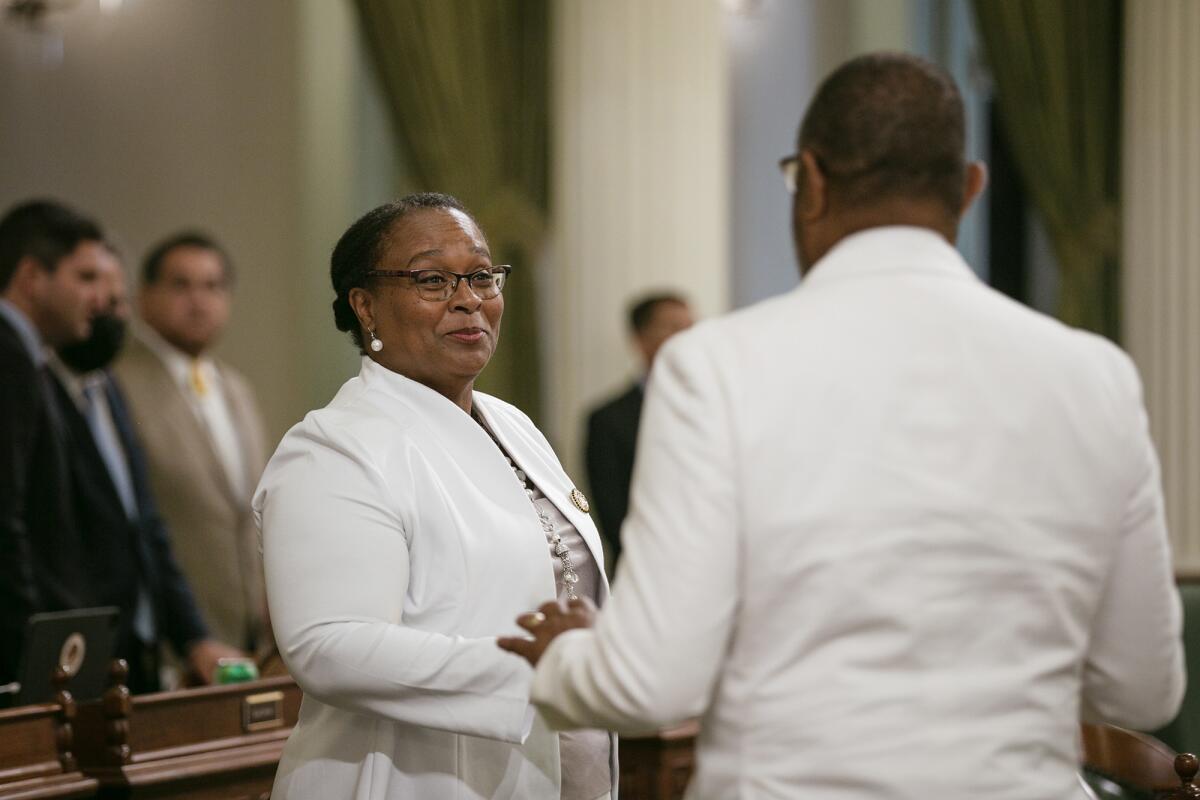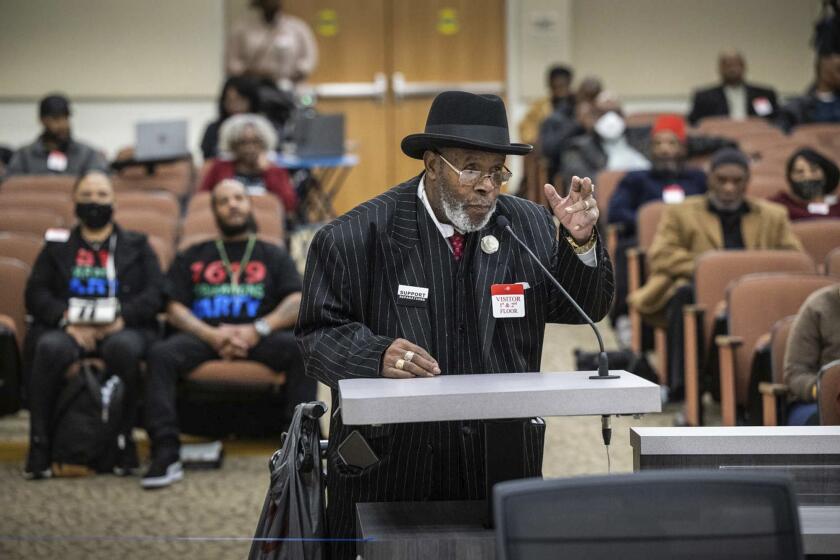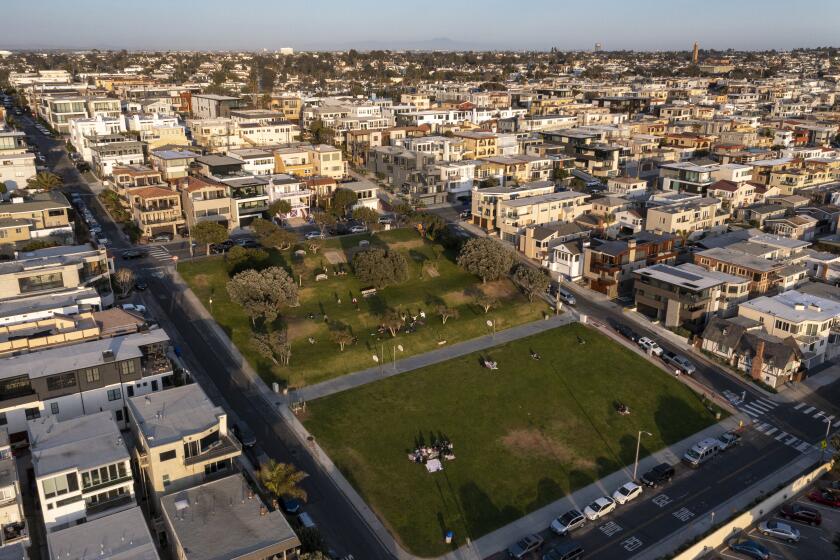California lawmakers unveiled 14 reparations bills. None of them call for cash payments

- Share via
SACRAMENTO — The California Legislative Black Caucus on Wednesday outlined the first set of reparations for the descendants of African Americans who were enslaved in the United States, with proposals that include a call for the state to issue a formal apology, to prohibit involuntary servitude in prisons and to return property seized by governments under race-based eminent domain.
The caucus is not yet calling for cash payments in a list of 14 reparations bills it hopes to pass this year that would enact wide-ranging reforms in education, civil rights, criminal justice, health and business.
The package of legislation is based on recommendations issued by California’s Reparations Task Force at the conclusion of a two-year historic process to study the effects of slavery and suggest policy changes to state lawmakers.
Assemblywoman Lori D. Wilson (D-Suisun City), chair of the California Legislative Black Caucus, said the apology is the first priority on the list of bills that she hopes will begin the conversation at the Capitol about reparations as she and her colleagues launch a campaign to educate the public about the state’s legacy of racism.
The decision to forgo an immediate call for cash payments comes as Gov. Gavin Newsom and lawmakers struggle to offset a budget shortfall of at least $37.9 billion. Newsom has proposed dipping into the state’s rainy-day reserves, cutting $8.5 billion from climate change initiatives and reducing more than $1.2 billion for housing programs as means to reduce spending to account for lower than expected tax revenue.
“We started realizing with the budget environment we were going to have to do more systemic policy change to address systemic racism versus big budget asks because there just wasn’t the budget for it,” Wilson said. “Our priorities centered around policy changes or creating opportunities.”
Sending the final reparations report to Newsom and California lawmakers puts them under political pressure to decide how the state should atone for slavery.
Newsom has echoed statements from the task force and Black lawmakers that reparations are about more than cash payments. In a recent interview, he said he finished reading through the task force’s report at the end of the year and his office is working on a detailed 30-page analysis of the recommendations that examines the work the state has already done and what more can be done.
When asked why his budget didn’t include reparations proposals, he said he knew the Black Caucus planned to share its own list of priorities and he didn’t want to get ahead of the group’s process.
“So we wanted to engage them,” Newsom said. “Remember, this was initiated by the Legislature. This is a partnership, and they recognize that there are a lot of things in that report they recommended that we’ve already done and that we’re doing. This gave us time to assess all that. So, it’s been actively worked on.”
Cash payments, in particular, have struggled to earn support among California voters, according to recent opinion polls. Newsom disregarded the idea that reparations could be tough to pass in an election year.
“That’s not been part of my thinking,” Newsom said. “My thinking is just accountability to be honest and responsible and to take seriously the recommendations.”
Wilson described the legislative package as the first phase of a multi-year effort to pass reparations. She said she hopes educating the public about California’s role in slavery and the harm caused by racist policies will help her colleagues and Californians understand the need for the state to atone.
The panel has a monumental challenge: crafting a historic reparations proposal that earns the support of Black Californians and a majority of California lawmakers.
The list of proposed bills the California Legislature Black Caucus wants to pass this year would do the following:
- ACA 7 — Amend the California Constitution to permit the state to fund programs for specific groups of people that help to increase life expectancy, improve educational outcomes and lift them out of poverty.
- ACA 8 — Amend the California Constitution to prohibit involuntary servitude for incarcerated people.
- ACR 135 — Formally recognize and accept the state’s responsibility for the harms and atrocities of state representatives who promoted, facilitated, enforced and permitted slavery.
- AB 1815 — Prohibit discrimination based on natural and protective hairstyles in all competitive sports within California.
- AB 1929 — Offer competitive grants to increase enrollment of African American descendants in STEM-related career technical education.
- AB 1975 — Offer medically supportive food and nutritional interventions as permanent Medi-Cal benefits in California.
- AB 1986 — End the California prison system’s practice of banning books without oversight and review.
Proposals that the caucus intends to introduce in the next two weeks would seek to:
- Offer career education financial aid to redlined communities.
- Restore property taken under race-based eminent domain or offer other remedies to the original owner.
- Issue a formal apology for human rights violations and crimes against humanity on African slaves and their descendants.
- Restrict solitary confinement in correctional detention facilities.
- Offer state-funded grants for African American communities to decrease violence.
- Require notification to community stakeholders before the closure of a grocery store in an underserved community.
- Eliminate barriers to occupational licenses for people with criminal records.
More to Read
Sign up for Essential California
The most important California stories and recommendations in your inbox every morning.
You may occasionally receive promotional content from the Los Angeles Times.













